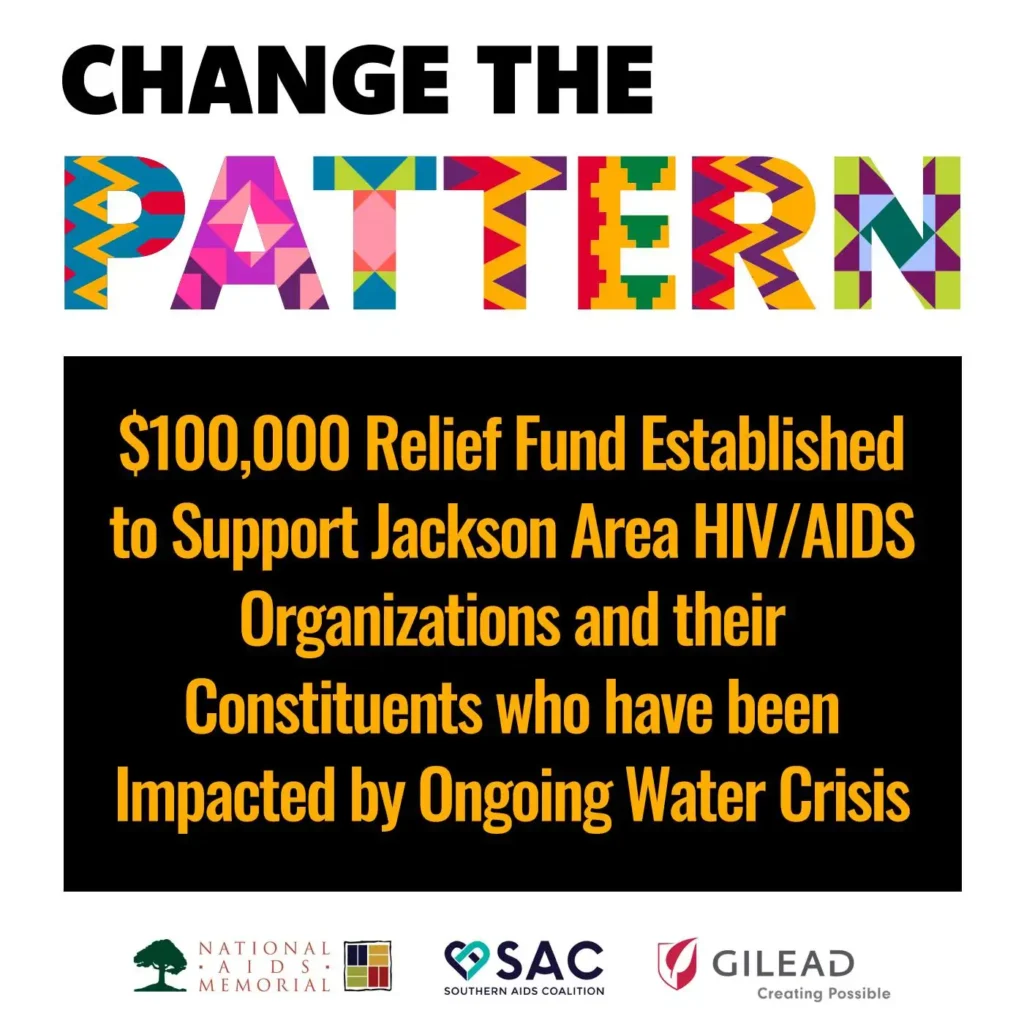For Immediate Release
Major Display of AIDS Memorial Quilt Coming to Jackson and Surrounding Communities Sept. 28 – Oct. 4 to Change the Pattern in the Fight to End HIV in the South
$100,000 Relief Fund Established to Support Jackson Area HIV/AIDS Organizations and their Constituents who have been Impacted by Ongoing Water Crisis
JACKSON, MS (September 13, 2022) – The National AIDS Memorial and Southern AIDS Coalition are bringing the AIDS Memorial Quilt to the Jackson area Sept. 28 – Oct 4. as part of its new Change the Pattern initiative to reimagine the fight to end HIV in the South. The weeklong Quilt display and programming, funded through the support of Gilead Sciences, aims to raise awareness about health disparities and social justice issues that continue to disproportionately impact communities of color.
The announcement was made at the Mississippi Civil Rights Museum, one of several locations hosting a Quilt display, where community leaders and HIV/AIDS service organizations joined together to also announce a $100,000 Change the Pattern relief fund to help area HIV/AIDS service organizations impacted by the ongoing water crisis. The relief fund will provide critical resources to help constituents who have been affected and are in need of care and services.
“The Quilt has always been a powerful teaching tool for justice, advocacy, and service and we are honored to bring its stories from the Black and Brown community to share with Mississippi through these displays and programming,” said Duane Cramer, Quilt Community Engagement, National AIDS Memorial. “We hope that these funds will help support HIV/AIDS organizations that continue to provide critical care and services for those in need.”
Dafina Ward, Executive Director, Southern AIDS Coalition added, “Our hope is that bringing the Quilt will shine a light on the systemic struggles our community faces still today, not just in the fight to end HIV, but the health and social justice issues that for too long have been ignored. By bringing the community together, providing support for each other, and raising awareness through advocacy, we will change the pattern.”
This powerful and timely Quilt exhibition will feature more than 500 hand-stitched panels of the AIDS Quilt that honor Black and Brown lives lost to AIDS and feature many newly made Quilt panels from Mississippi and the Jackson area, which will be featured for the first time publicly. They are meant to be a call to action to disrupt systemic issues that impact health equity which continue to disproportionately impact communities of color and marginalized populations.
Accompanying the Quilt displays will be powerfully curated stories that share the love, remembrance, pain, and celebration sewn into each Quilt panel of lives lost from within the Black, Latinx, Indigenous, Transgender and other marginalized communities. Several new Quilt panels from Mississippi will be part of the exhibition, including ones honoring Jackson State University professor Dr. Mark A. Colomb, a beautiful panel for residents who were cared for at Grace House, 14-year-old Hemophiliac Michael Felton, and Lavadious Walker, who was celebrated in the Trans community. A panel made by legendary civil rights and justice activist Rosa Parks, who was a supporter of the AIDS Quilt, will also be featured in the display.
Dr. Shanell McGoy, Director of Corporate Giving at Gilead Sciences, who helped make one of those new panels recently, said, “Gilead is so honored to help support this important program that brings the Quilt to communities across the Southern United States as a healer, a teacher, and a change-maker, as it has been for more than three decades. The program is helping us look at new ways to reach and actively engage communities that continue to be disproportionately impacted by HIV so we can help end the epidemic.”
Throughout the week, community partners will host free educational forums, health screenings, advocacy, and quilt panel-making. Programming will include conversations on topics of importance to the community: health disparities, rising HIV diagnoses, environmental justice, and the stigma that persists today in the long struggle for health and social justice in the South.
The Quilt can be viewed by the public at the Mississippi Civil Rights Museum, Jackson Medical Mall, Jackson State University Student Center, local churches, City Hall, Capitol City Pride, and other locations across Jackson and the Delta. The public is encouraged to visit www.changethepattern.org for detailed map of Quilt display locations and free programming and event information. Local community partners for the Mississippi Change the Pattern Quilt display and events include: AIDSWatch Mississippi, My Brother’s Keeper, Capital City Pride, Care4Me Services, AIDS Services Coalition, Community Health-PIER, Jackson Medical Mall, The She Project, Love Inside for Everyone, Mississippi Center for Justice, Jackson State University, Mississippi Dept. of Health Office of STD/HIV, Two Mississippi Museums and Visit Jackson, among others.
“Bringing the AIDS Quilt to Mississippi is particularly important as we work together as a community to reimagine the fight to end HIV in our state,” said Robin Webb, Director, AIDSWatch Mississippi. “The Quilt helps open hearts and minds to those we’ve lost and how we can use those stories to educate, advocate and finally end this epidemic.”
The statistics speak to the importance of the Change the Pattern initiative in the South. In 2020, the South comprised 38% of the U.S. population but represented over half (52%) of new HIV diagnoses. The disproportionate burden of HIV in the South is experienced among certain populations, such as Black women, Black and Latinx gay, and bisexual men, and Black and Latinx transgender women. Georgia, Louisiana, Mississippi, Texas, South Carolina, Alabama, North Carolina, and Tennessee rank in the top 15 with the highest rates of HIV in the country. Racism, HIV stigma, homophobia, poverty, and barriers to health care continue to drive these disparities.

